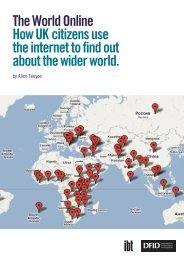World
Viewing the world - Full report
Viewing the world - Full report
- No tags were found...
You also want an ePaper? Increase the reach of your titles
YUMPU automatically turns print PDFs into web optimized ePapers that Google loves.
PRODUCERS PURSUING THEIR OWN AGENDAOn the other hand there is some sensitivity aboutproducers who appear to put their personal agenda firstand foremost.“Some producers in this area pursue their own agendawithout thinking how to make it palatable to a generalaudience” Ali Rasheed, Real Time“There’s always been a pretty consistent North-Southagenda,done in bits and pieces. But most of the producerswho make these programmes make them out of a sense ofcommitment that they ought to be made. That convictionis vital, but the trouble is they don’t think very hard aboutwho might want to watch them, and how to get people towatch.” Tim Gardam, Channel 4“This is the most blinkered of all the debates abouttelevision. There’s a whole raft of people who think theyhave the right to make programmes on developmentissues without any reference to the audience. And bydevelopmental issue they don’t mean an issue at the coreof the survival or advancement of a developing country.They mean that tension between the developed anddeveloping world. That’s what they are on about. Only. Iwas shocked to find there were people who would not seethat Africa Express was an attempt to modernisecoverage of the developing world, people who continue toexist within their own laager, way back in decades past,when the only thing that mattered was this tensionbetween the First and the Third <strong>World</strong>” David Lloyd,Channel 4G.5.1.2. Practical problemsSHORTAGE OF AIRTIMENews staff are particularly aware of the airtimelimitations of a news bulletin, and the competition to geta story on.“We are always vying with domestic news stories, so thereisn’t usually time to do features” Al Anstey, ITN“There is always so much to report, so no single type ofstory is going to be covered comprehensively” NigelDacre, ITN“We couldn’t fit in many more foreign stories,with newsprogrammes only about half an hour long. Time is thebiggest problem when it comes to explaining complexstories” Vin Ray, BBC NewsCOST OF FOREIGN PROGRAMME-MAKINGAs discussed under Commissioning Criteria: Budget (G.3.)SHELF-LIFE“Most cable and satellite channels look for a long shelf-lifefor their programmes – around three years – so can’tafford to take anything too topical” Nick Comer-Calder,DiscoveryPERSONAL DANGERA factor for the BBC Holiday team who pulled out ofTurkey and Croatia when advised these would not be safefor tourists. It can of course be an issue for news staff too.PHYSICAL DISTANCE“Physical distance can be a deterrent on developingworld stories. Sometimes it ‘s impossible to get to distantlocations on the same day as the story breaks, and thatcan influence your judgement on whether or not to senda correspondent.” Al Anstey, ITN“It can be difficult to get around when you don’t have thesame journalistic networks you have over here” GeorgeCarey, Mentorn Barraclough CareyGLOBAL CHANGES/BRITISH INSULARITYSome interviewees see television’s apparentlydiminishing interest in world affairs in the context ofcertain global changes.“My personal opinion is that in the ’70s and into the ’80sthere was an appetite for certain international coverage,like environmental programmes. But after the collapse ofthe Berlin Wall foreign budgets moved into EasternEurope, away from the broader global scene” TimGardam, Channel 4“Twenty years ago there were many programmes aboutthe Third <strong>World</strong>, partly through a paternalistic interest,the legacy of empire, and partly because it was theideological battleground of the Cold War. Now there’smuch less interest” George Carey, Mentorn BarracloughCarey“Somehow the world has got more ‘global’ and yetindividuals have gone more domestic and inward –looking, perhaps because they can’t cope with the scale ofthe change. “ Ali Rasheed, Real TimeSeveral other interviewees speak of the insularity ofthe British audience…“Our focus groups show that the British are more insularthan other Europeans” Nick Comer-Calder, Discovery“We have to link to the audience zeitgeist, and thedeveloping world is not a general interest area to a UKaudience” Chris Shaw, Channel 5DFID – July 2000 165





